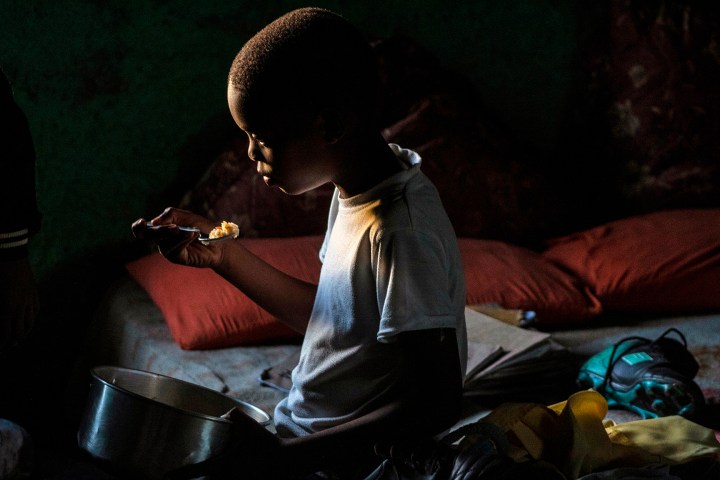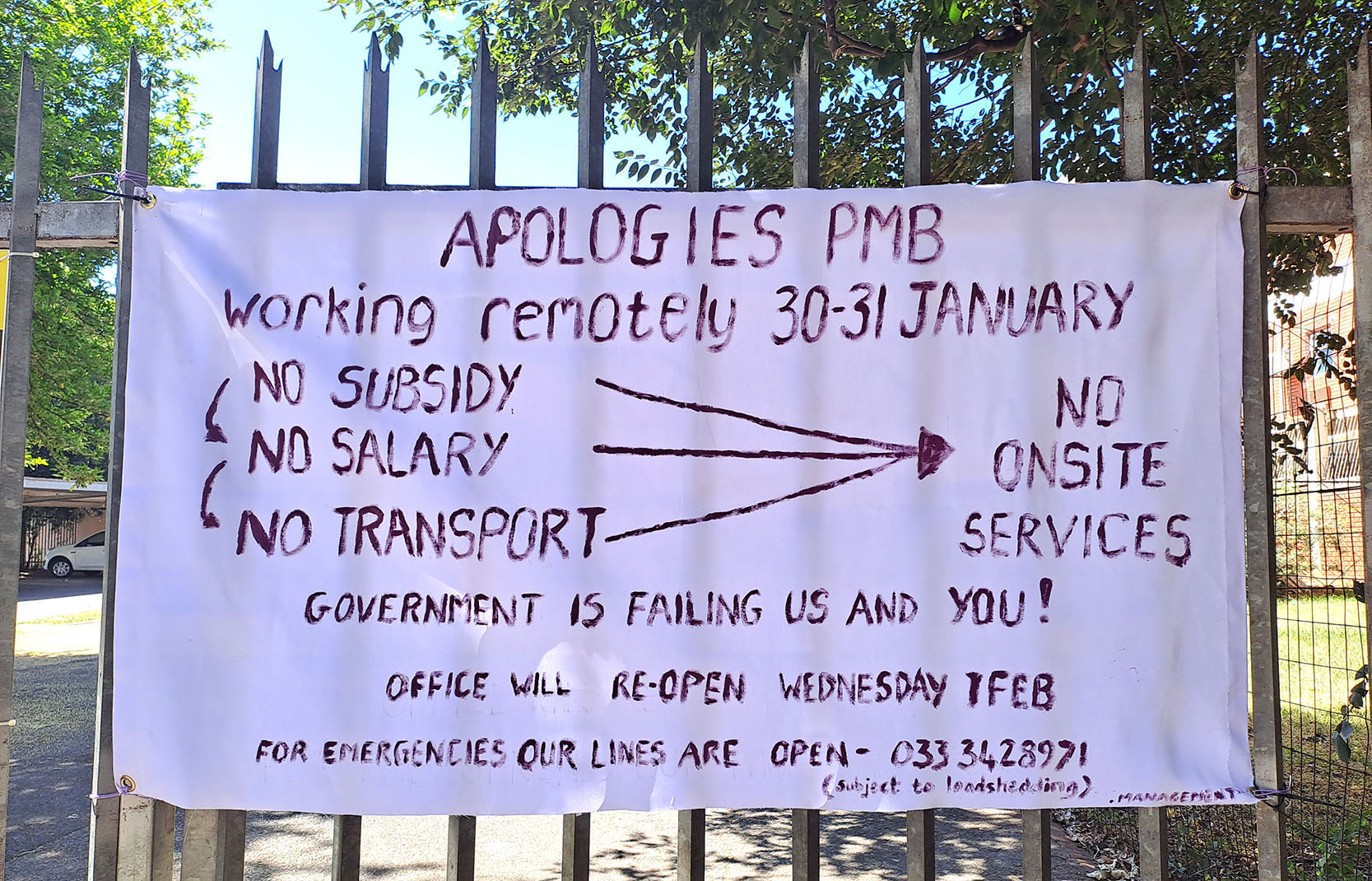BATTLE FOR FUNDS
NGOs and civic organisations in KZN raise alarm over unpaid subsidies

Late payments from the Department of Social Development for NPOs in KwaZulu-Natal have become the norm and some claim the welfare sector in the province is on the verge of collapse.
On 30 January, the Pietermaritzburg Child and Family Welfare Society had to close its doors for two days after a delay in subsidy payments from the Department of Social Development.
Julie Todd, the director and CEO of the non-profit organisation (NPO), said the decision to close its doors and work remotely was not easy. However, the continual late payments of critical government subsidies had left them struggling to perform their duties and provide services to some of the province’s most vulnerable people.
“There is a cash flow problem and we have raised this issue for the past 10 years with [the Department of] Social Development to ask what are they doing to ease the situation,” she said.
Nothing new
This is not the first time the organisation has experienced late payments, as December payments were also delayed. Todd explained that while the volume of work had increased, the number of posts that the department subsidises had not.
“They subsidise the number of posts that they determine they’re going to subsidise; they do not subsidise in terms of what the need is — and it hasn’t changed in 20 years,” she said.

Non-government organisations (NGOs) in KwaZulu- Natal are struggling to keep their doors open after continuous late payments from the Department of Social Development. (Photo: Supplied)
In KwaZulu-Natal, the department provides a subsidy for a social worker post and a community worker post, and the onus for the remaining posts falls on the shoulders of individual organisations.
“We have tried to get additional posts because of the volume of the work that has changed, but the standard response is that there’s no money,” she said.
Minimal increase and silence from funders
The department has increased subsidies only twice in seven years.
“Everything’s gone up — operational expenses, personal expenses, municipal expenses, everything has gone up,” said Todd. When this was queried last year, Todd was told the budget had been cut and the department was unable to give any more money.
Todd credits the head of the department for listening to what organisations were saying, which led to a 5% increase for the NPO sector in the province.
However, there are some concerns regarding this increase. As the department pays in arrears after services are rendered, this payment was paid in May for April. According to Todd, if the national government makes money available to the province, it’s payable for that financial year and what is not spent is sent back.
“So if national has made 5% available to this province for the NPOs for 12 months, why is this province only paying out 11 months? What are they doing with that additional month? Why hasn’t that been paid over to the sector?”
The matter had been raised with the head of the department (HOD), but organisations had still not received a reply, she said
She said they were waiting for unpaid money from the National Lotteries Commission (NLC) after a contract was signed in November.
“When we phone the lottery board to find out what’s happened, we get told we are harassing them, we must be patient, and don’t we see the news that ‘we are busy freezing assets’?”
Idaho Sengani, the spokesperson for NLC said: “As of 31 December 2022 (the end of Q3), R369-million had been allocated to Programme Area 1 [early childhood development] and Programme Area 3 [protection of the vulnerable].
“The impact of corruption cannot be disregarded. The NLC has acknowledged the weaknesses that have revealed themselves in several operational processes and reiterated the commitment to strengthen controls at every level as part of continuous improvement.”
Retrospective payments causing harm
A significant challenge that organisations have lobbied about for a while is that they are paid retrospectively.
Fiona Balgobind, the general manager of the Pietermaritzburg Children’s Home, explained that this creates a huge cash flow issue in the NGO sector. According to their service level agreement, payments can come between the first and the last day of the following month.
“That’s what the department binds you by; we can’t complain up until the very last day,” she said.
For some organisations with extra reserves and income, this is manageable. For others that do not have reserves, this is impractical and has forced them to change salary pay-out dates for staff.
“Right now, when we get paid in arrears, it does create cash flow problems. You have an organisation like us whose salary budget is almost R400,000 per month; if we’re only getting the state subsidy late, that means we’ve got two paydays we have to do, so basically, we have to try and have R900,000 cash flow,” said Todd.
She explained that this is simply not possible for many NPOs and that the issue had been repeatedly raised with the department over the past 10 years.
Many have called for the payment system to be changed and for payments to be made in advance, as in the Western Cape.
“The new HOD came in and we took up the issue with her last year and she said she would look into it, but there is a news clip of her saying things are going to stay the same, but there is no reason for that,” Todd said.
No answers and no solutions
Communicating with the department was often a struggle, said Todd.
“Despite what the HOD said on the eNCA news clip, there was no communication whatsoever with NPOs to say there was a problem and that you’ll be paid late — nothing, absolutely nothing.
“It was the odd organisation that got a message, saying that there will be a delay in the payments, but that was it. We don’t have any answers. We just don’t get any answers.”
Balgobind said attempts to change the payment system had been unsuccessful.
NPOs have also requested a set date for payments.
“On the day when your subsidy should be going in, you will find that you haven’t received it, and you will need to make the follow-up yourself as the NGO, as to why your money is not being paid into your account,” Balgobind said.
They had also asked for written confirmation of the money they will receive, again to no avail.
“We have asked the department many times for us to receive a return stub or some sort of formal written confirmation of the value so that you can reconcile the amount that you are supposed to receive to what comes through,” she said.
Nelisiwe Vilakazi, the head of the Department of Social Development, said the matter of making payments in advance was raised in the meeting between the department and the NPOs and was supported by the management of the department.
“The department contacted the Provincial Treasury requesting an increase of the cash flow so that tranche payments could be implemented, but that request was not supported. The department has requested further bilateral [talks] with the Provincial Treasury so that the matter is finalised,” she said.
The Nawongo case
Balgobind said the National Association of Welfare Organisations and Non-Governmental Organisations (Nawongo) case is a critical issue when it comes to the financing of NGOs in South Africa.
Nawongo brought a court application against the MEC for social development in the Free State, the head of the Free State Department of Social Development, and the national minister of social development.
This followed years of frustration about how the department dealt with transfers (or subsidies) to NPOs for delivering welfare services to vulnerable people on behalf of the department.
The frustration arose from delays in payment and the failure of the department to communicate how much it would pay them for the services they delivered. Additionally, the subsidies were insufficient, resulting in NPOs being unable to deliver services badly needed by poor and vulnerable people in the province.
The ruling from the case is relevant for NPOs and provincial departments of social development in other provinces because the Free State policy on funding NPOs is almost identical to the national policy, which covers all provinces.
Balgobind explained that children’s homes in KZN had an issue with how the department wanted to implement the order.
“We needed to have a united voice to raise our issues because we were not receiving any support from the department in terms of engaging with us appropriately, on how those Nawongo requirements were expected to be implemented for the province,” she said.
Visit Daily Maverick’s home page for more news, analysis and investigations
The department opted to implement the order in the child and youth care sector. “But how they wanted to implement it was not suitable. They wanted to bring in their own service providers, and not actually put the cash outlay into the facilities.”
Organisations responded by saying that they would prefer to receive cash benefits directly and individually to their respective organisations as each organisation had its own needs.
“Each institution has a different number of children, different ratios of children with special needs, learning impairments; we have different age groups in all our facilities. So, my needs will differ from another facility, and it would make sense because I would know what my priorities are and another institution will know what their priorities are,” she explained.
As Covid-19 hampered fundraising efforts and increased donor fatigue, the majority of children’s homes in the private sector in the province would have had to shut their doors if it was not for the Nawongo subsidy increase, she said.
“The judgment was purely because NGOs have over the years continuously stated the fact that we provide an equal service to what the state provides.”
Services given to a child in a private residential facility, a private welfare organisation or a private children’s home are the same as the services offered by a state facility.
“So our question has always been, why is the state subsidy different for a child in a state facility to a child in an NPO? And we want to close that gap between the subsidy rates that they pay towards a state facility and against NPO organisations,” she said.
The word from the department
The Department of Social Development’s Vilakazi said the department was aware of issues with NPOs’ subsidy payments in the province.
“The department has systems in place to rectify the issue. The department had systematic challenges in December and January which led to the late payment of some of the NPOs; however, this has since been resolved.”
Vilakazi maintained that the department communicates with NPOs when there is a problem and when the problem has been resolved, including indicating when payments will be in their accounts.
“The NPOs have access to all staff of the department at the different levels of operation. The NPOs also have direct access to the head of department, should they not find joy at some of the levels of the department,” she explained.
Looking forward
At the time of publication, the Department of Social Development reiterated that the issues were only in December/January and that the matter had been resolved and was being monitored.
However, Todd anticipates another late payment this month, as they normally receive remittance advice but have not received one yet. A month-end payment of subsidies would mean that staff only get their salaries next month.
Todd said: “This is getting ridiculous — we desperately need the funds, we cannot pay our bills and this is turning into a desperate situation.” DM/MC




















 Become an Insider
Become an Insider
There is no money….it’s all been stolen! That’s the ANC for you…wake up people!